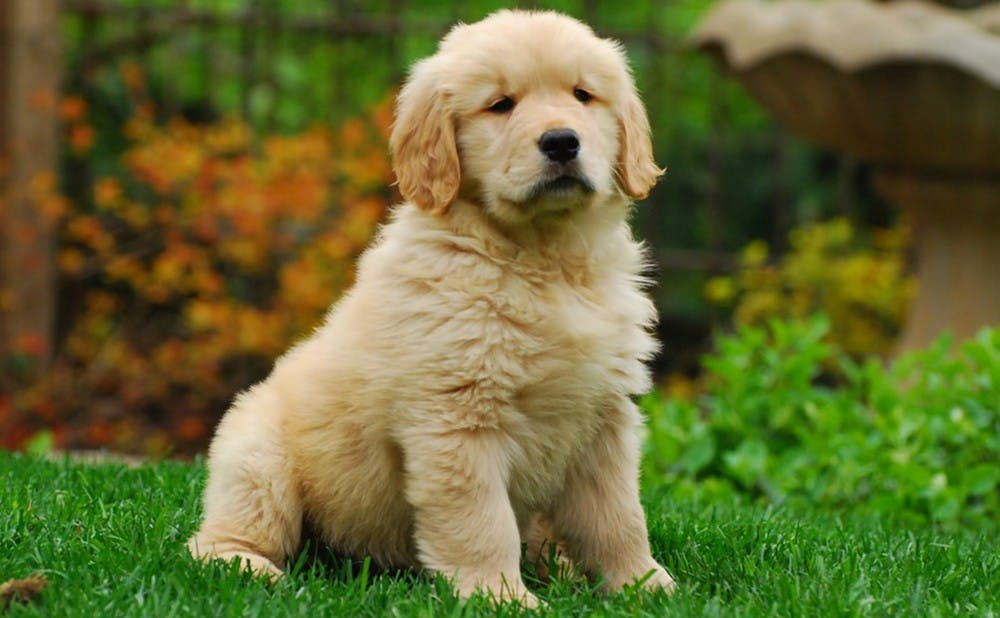Do you miss your dog at home? Are you stressed out over midterms? Is Nugget’s appeal getting old? Duke Canine Cognition Center’s puppy kindergarten has you covered.
The project, which started during Spring Break this year, is training two puppies to be service dogs through Canine Companions for Independence, an organization that provides free assistance dogs to adults, children and veterans with disabilities.
The two newest members of puppy kindergarten are a golden retriever named Kyler and a black lab named Ernie, who are each about 12 weeks old. So far, they’ve been adjusting to life in Durham and took part in the Spring Breakthrough course led by Brian Hare, associate professor of evolutionary anthropology and founder of the Duke Canine Cognition Center.
“The puppies will be here through [the] end of the semester,” explained Kyle Smith, the lab’s manager. “After their time here, they will go on to be placed with puppy raisers who take care of them and teach them basic commands, then more formal training.”
In the meantime, the lab has 58 volunteers who each come in for two-hour shifts from 6 a.m. to 10 p.m. to care for the puppies and train them.
“They also just take them around campus to socialize them, to get them used to sights and smells and people so they can become service dogs,” Smith said.
Think these volunteer spots were highly sought after? You’re right. Smith noted that more than 700 people were initially interested in the positions. Volunteers had to attend mandatory info sessions and were required to take a Coursera course.
Senior Elizabeth Anne Brown is one of the lucky students selected as a volunteer. She explained that one of her favorite parts of the role is taking the puppies around campus to places like the library and the Allen Building.
“The puppies are not so great at walking on their leashes,” she said. “They like to be carried everywhere they go.”
Although the volunteer spots are currently all filled, you can apply again in the fall.
Vanessa Woods, a research scientist in evolutionary anthropology who is involved with the puppy kindergarten, explained that the puppies have provided an overwhelming sense of joy so far.
“All the research is showing that dogs are this incredible emotional support for people,” she said. “Dogs have this really special connection with people.”
This is especially true for undergraduates who may be missing their dogs at home, she added. Some students have been so happy to see the puppies that they were almost moved to tears.
The puppies have not yet been involved in any research projects, but Smith said they are hoping to test some of the puppies and see how their cognitive abilities develop over time. One goal is to predict accurately which dogs will be successful service dogs.
He noted that most people focus on labradors and golden retrievers as prime service dog candidates because they are fairly calm, obedient and easily trainable.
“We don't have any technology that can help people as well as these dogs can,” Woods said. “They can turn light switches on and off, they can open doors, they can do your laundry.”
Woods added that there is a gap in research following young dogs longitudinally, which is something the lab hopes to do in the future. She also emphasized the importance of the work done by Canine Companions for Independence.
If you’re dying to see the puppies, Smith said you can stop by their lab in Bio Sci room 002A to meet them.
Woods added that it will be hard to let Kyler and Ernie go at the end of the semester, but that knowing they are going to Canine Companions for Independence will make it easier.
“We love these puppies, but we know were doing to love the next puppies, and we know we’re sending them off into the world to help people,” she said.
Get The Chronicle straight to your inbox
Signup for our weekly newsletter. Cancel at any time.

